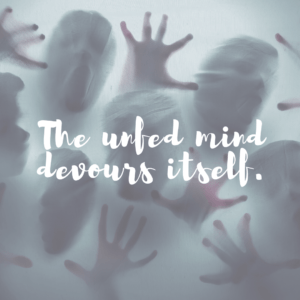A few years ago, I wrote a post about how trauma creates changes you don’t choose. Healing is about creating change that you do choose. Part of healing is acknowledging the role we have played in our own suffering.
How We Play a Role in Our Own Suffering and What to Do About It
Regardless of what created our suffering, we need to become aware of how we may have contributed to it.
Denial
Sometimes we deny that we are even hurting. Perhaps we are judging our feelings as “bad” so we deny that they exist because we feel they aren’t acceptable. Or maybe we have been denying the pain we have for years, and we’ve become numb to it.
While it is human nature to want to avoid pain and suffering, acknowledging the fact that you feel wounded will help you with acceptance. The more we try to deny that a feeling is there, the more it festers. Accept what you are feeling without judgment.
Blaming Others
It is also human nature to blame others for our suffering. While someone may have wronged you or you may have gotten dealt a bad hand, blaming them for your continued suffering is like giving all your power away. You cannot control external circumstances, but you always have control over your response to it. And that is your power.
Take complete ownership of your life, right here and right now. While you didn’t deserve what happened to you, you can determine how you think about it and how you respond to it.
Unproductive Thoughts
We need to be mindful of our thoughts. As they say, our thoughts determine our reality. We tend to perpetuate our own suffering by our thoughts and actions. We may get overly focused on past regrets or get caught in the “if only” X had happened loop. These thoughts are unproductive when they happen too often because there is no solution to making the situation better. What has happened has happened already and there is nothing that can be done about it.
Here’s a great example of how I have to manage my unproductive thinking patterns. I recently had blood work done by my family physician that had some minor abnormal results. I was really freaked out after googling it multiple times and researching what it meant for far too long.
I contacted my endocrinologist who listened to all my concerns and then challenged me. He looked at me and said, “Let’s run the tests again, and we’ll run some additional tests that will give us context to what the results might mean. But let me ask you this, what are you going feel if the tests come back normal this time or the other tests provide the context we need?” (The context was that these abnormalities were being cause by Tamoxifen, a drug I am on to treat breast cancer.)
I was silent for a minute and then said, “I don’t know. I’ve spent a lot of time freaking out about this and it may have been for nothing.”
He smiled and encouraged me to focus on other things that actually bring me joy. In the end, my blood work was fine. But boy did I get caught up in some unproductive thoughts! And they truly permeated my days, as I panicked about what it meant.
Get into the habit of challenging your thoughts. Ask yourself if they are productive in helping you achieve your goals and live the life you want to live. Ask yourself if they are making you feel empowered or a victim of your circumstances.
We Often Talk About It
When we are still suffering, it is reflected in what we talk about. I know plenty of people, who are still talking about how hurtful someone was to them over a decade ago. Or what a horrible boss so and so was, but they haven’t worked for him in years. Social media also helps us air our grievances to the world and get feedback that enforces our feelings of being victimized.
When you feel the urge to continuously talk about it, try focusing on something positive to say. Or perhaps what you feel grateful for. Try to shift the conversation away from your suffering for a period of time.
We Catastrophize
We all catastrophize situations from time to time. It’s easy to do when stressed out! But if you find yourself catastrophizing often, it is like adding fuel to the fire. You are adding meaning to something that might not even be true.
Be mindful of these feelings and let them come and go, like waves. Don’t judge yourself for having them. Challenge yourself by asking if what you are feeling is really true. For example, if you lost your job and you feel like you will never another one, as yourself if that is really true.
We Believe We Are Alone
When we are suffering and going through difficult times, it’s easy to fall into the pattern of believing that we are alone in it. The truth is all of us experience some form of suffering in our lives. But when we become overly focused on our own suffering, we may isolate ourselves and not get the support we need from others. Or we may become so focused on our own suffering, that we don’t show up for other people going through difficult times, too.
Reach out to the people in your life and connect with them. Offer encouragement or do something nice for them. Allow them to do the same for you. Healing ourselves from past traumas is necessary for us to have deep, meaningful relationships. Otherwise, if you don’t heal what hurt you, you will bleed on people who didn’t cut you.




